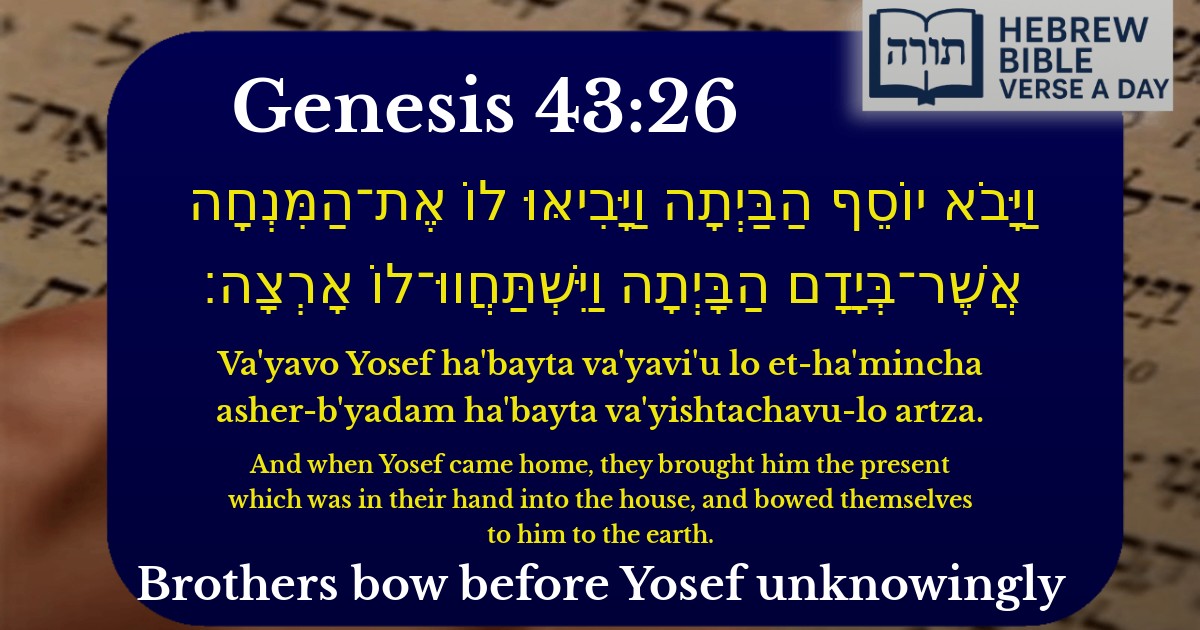Join Our Newsletter To Be Informed When New Videos Are Posted
Join the thousands of fellow Studends who rely on our videos to learn how to read the bible in Hebrew for free!
Hebrew Text
וַיָּבֹא יוֹסֵף הַבַּיְתָה וַיָּבִיאּוּ לוֹ אֶת־הַמִּנְחָה אֲשֶׁר־בְּיָדָם הַבָּיְתָה וַיִּשְׁתַּחֲווּ־לוֹ אָרְצָה׃
English Translation
And when Yosef came home, they brought him the present which was in their hand into the house, and bowed themselves to him to the earth.
Transliteration
Va'yavo Yosef ha'bayta va'yavi'u lo et-ha'mincha asher-b'yadam ha'bayta va'yishtachavu-lo artza.
Hebrew Leining Text
וַיָּבֹ֤א יוֹסֵף֙ הַבַּ֔יְתָה וַיָּבִ֥יאּוּ ל֛וֹ אֶת־הַמִּנְחָ֥ה אֲשֶׁר־בְּיָדָ֖ם הַבָּ֑יְתָה וַיִּשְׁתַּחֲווּ־ל֖וֹ אָֽרְצָה׃
וַיָּבֹ֤א יוֹסֵף֙ הַבַּ֔יְתָה וַיָּבִ֥יאּוּ ל֛וֹ אֶת־הַמִּנְחָ֥ה אֲשֶׁר־בְּיָדָ֖ם הַבָּ֑יְתָה וַיִּשְׁתַּחֲווּ־ל֖וֹ אָֽרְצָה׃
🎵 Listen to leining
Parasha Commentary
📚 Talmud Citations
This verse is not quoted in the Talmud.


Context in the Narrative
The verse (Bereishit 43:26) describes the moment when Yosef's brothers bring him a gift and bow before him, fulfilling his earlier dreams (Bereishit 37:5-11). This occurs during their second journey to Egypt to buy food during the famine, with Binyamin now present as Yosef had demanded.
Rashi's Explanation
Rashi notes that the brothers brought the gift "into the house" because they initially found Yosef in his royal court, but he then went inside his private residence. The brothers followed him there to present their gift, demonstrating proper protocol when approaching a ruler. Their bowing fulfills Yosef's prophetic dream of his brothers' sheaves bowing to his sheaf (Bereishit 37:7).
Ibn Ezra's Insight
Ibn Ezra emphasizes that the brothers "bowed themselves to him to the earth"—a complete prostration reserved for royalty or divine encounters. This mirrors Yaakov's later bowing to Yosef (Bereishit 47:31) and underscores Yosef's elevated status, foreshadowing the Jewish people's future subjugation in Egypt before rising to greatness.
Midrashic Interpretation (Bereishit Rabbah)
Rambam's Perspective (Guide for the Perplexed)
Rambam views this scene as part of Hashem's grand design to position Yosef as Egypt's leader to save his family during famine. The bowing represents not just personal submission but the necessary steps for the Jewish people's survival and eventual formation as a nation.
Halachic Dimension (Sefer HaChinuch)
The Chinuch (Mitzvah 30) references this verse when discussing the prohibition against bowing on stone floors (a practice associated with idolatry). Here, the bowing is permitted because it is directed properly—to a human leader in a non-idolatrous context.